Related Research Articles
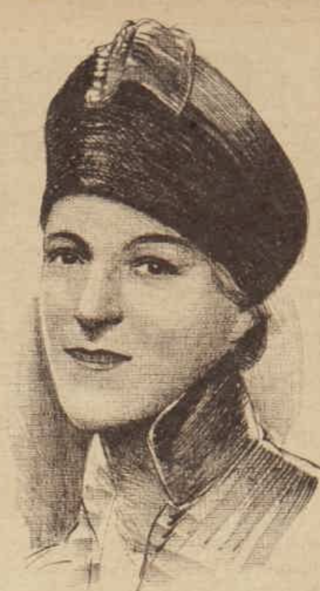
Evelyn May Clowes, known by the pseudonym Elinor Mordaunt, was an English author, writer and traveller born in Nottinghamshire, England. Her travels included Mauritius and Australia; she undertook a wide variety of employment.
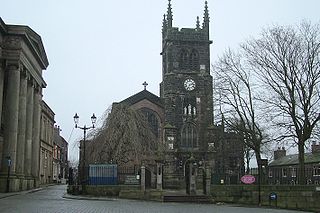
St Michael and All Angels Church overlooks Market Place in the town of Macclesfield, Cheshire, England. It is an active Anglican parish church in the diocese of Chester, the archdeaconry of Macclesfield and the deanery of Macclesfield. It forms a team parish with three other Macclesfield churches: All Saints, St Peter's and St Barnabas'. The church is recorded in the National Heritage List for England as a designated Grade II* listed building.

St Mary's Chapel is a former Anglican parish church in the village of High Legh, Cheshire, England. It is recorded in the National Heritage List for England as a designated Grade II* listed building.

No Orchids for Miss Blandish is a 1948 British gangster film adapted and directed by St. John Legh Clowes from the 1939 novel of the same name by James Hadley Chase. It stars Jack La Rue, Hugh McDermott, and Linden Travers, with unbilled early appearances from Sid James, as a barman, and Walter Gotell, as a nightclub doorman. Due to the film's strong violence and sexual content for its time, amongst other reasons, several critics have called it one of the worst films ever made.

Soho Conspiracy is a 1950 British 'B' musical drama film directed by Cecil H. Williamson and starring Jacques Labrecque, Zena Marshall and Peter Gawthorne.

The Quiet Woman is a 1951 British crime film directed by John Gilling and based on a story by Ruth Adam, about a criminal's wife who attempts to build a new life after her husband goes to prison, only to be menaced by him when he escapes. It starred Derek Bond, Jane Hylton and Dora Bryan.
Enter the Queen is a 1930 British silent short comedy film directed by Arthur Varney and starring Richard Cooper, Dora March, Chili Bouchier and Percy Walsh.
Grand Prix is a 1934 British sports drama film written and directed and produced by St. John Legh Clowes and L.S. Stock, and starring John Stuart, Gillian Sande, Milton Rosmer and Peter Gawthorne.
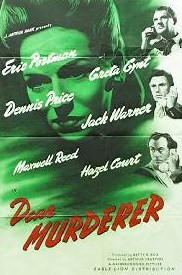
Dear Murderer is a 1947 British film noir crime, drama, thriller, directed by Arthur Crabtree for Gainsborough Pictures, and starring Eric Portman and Greta Gynt.
The Bondman is a 1929 British silent adventure directed by Herbert Wilcox and starring Norman Kerry, Frances Cuyler, and Donald Macardle. It was based on the 1890 novel The Bondman by Hall Caine.
Life Goes On is a 1932 British crime film directed by Jack Raymond and starring Elsie Randolph, Betty Stockfeld and Warwick Ward. It was made at British and Dominion's Elstree Studios as a supporting feature for release by Paramount Pictures.

The Ghost Camera is a 1933 British mystery film directed by Bernard Vorhaus, starring Henry Kendall, Ida Lupino and John Mills, and based on "A Mystery Narrative", a short story by Joseph Jefferson Farjeon.
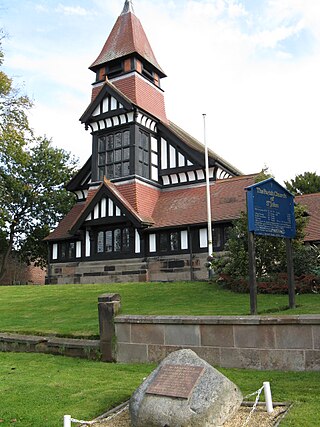
St John's Church is an active Anglican parish church in the village of High Legh, Cheshire, England. It is in the deanery of Knutsford, the archdeaconry of Macclesfield and the diocese of Chester.
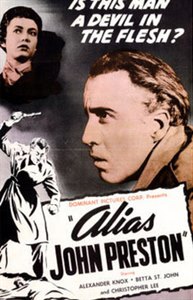
Alias John Preston is a 1955 British 'B' thriller film directed by David MacDonald and starring Christopher Lee, Betta St. John and Alexander Knox. A mysterious and wealthy man moves to a small village where he outwardly appears to be a friendly figure but nurses a dangerous secret.

No Trace is a 1950 British second feature crime film directed by John Gilling and starring Hugh Sinclair, Dinah Sheridan and John Laurie. A crime writer murders a blackmailer, and is then asked to help solve the case by the police.

Impulse is a 1954 British second feature film noir directed by Cy Endfield and starring Arthur Kennedy, Constance Smith and Joy Shelton.
Files from Scotland Yard is a 1951 British crime film directed by Anthony Squire and starring John Harvey, Moira Lister and Louise Hampton. It was made as a second feature on a very low-budget, and the production company was wound up soon afterwards.

Act of Murder is a 1964 British crime drama film, directed by Alan Bridges. One of the Edgar Wallace Mysteries series, it was Bridges' first film as director.
St. John Legh Clowes (1907–1951) was a South African writer and director.
The Monarch Film Corporation was a British film distribution company active during the 1940s and 1950s. It specialised in supplying second features to British cinemas. The company handled a mixture of British and American films, as well as the Australian film Strong Is the Seed. It involved itself in production at times, and produced several more ambitious features including Hindle Wakes (1952) and A Yank in Ermine (1956). It had an arrangement with ACT Films under John Croydon to handle films made at Walton Studios. The 1952 adventure film Men Against the Sun (1952) was, unusually for the second feature market, a costume adventure film despite its running time.
References
- ↑ Chibnall p.271